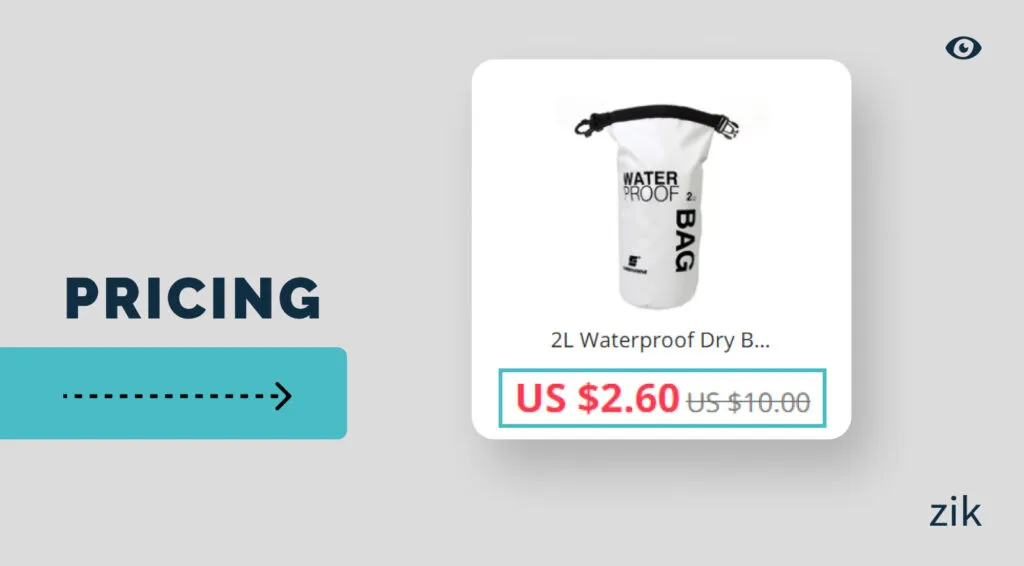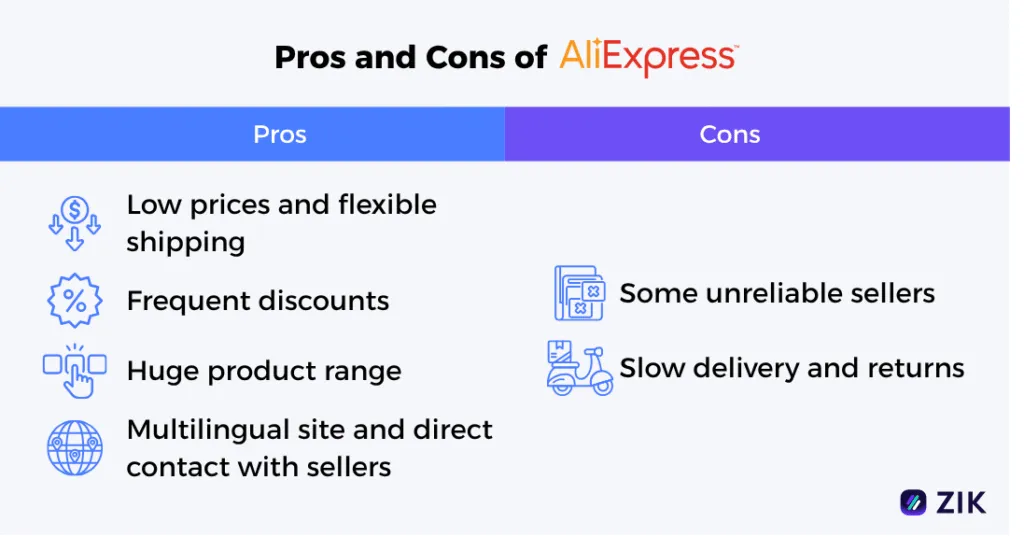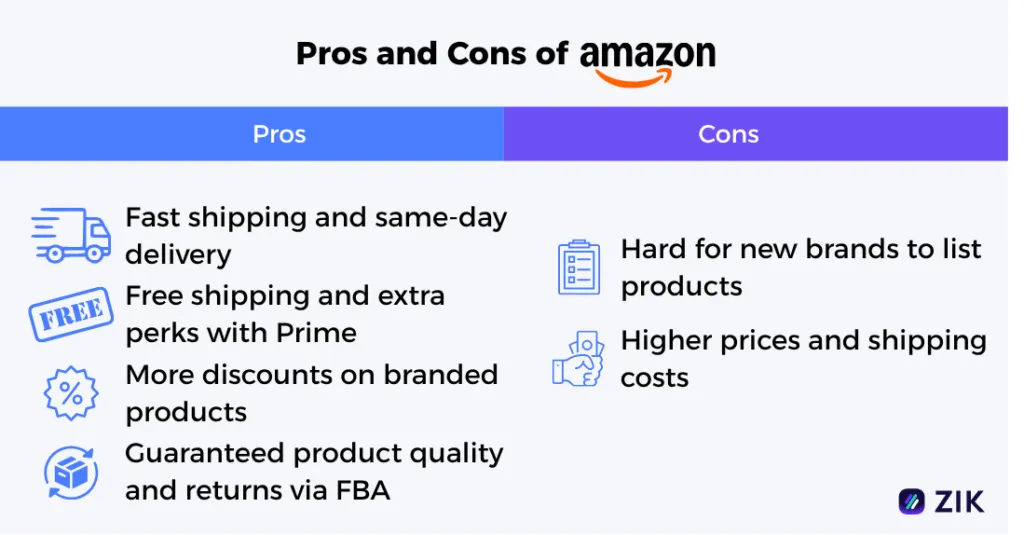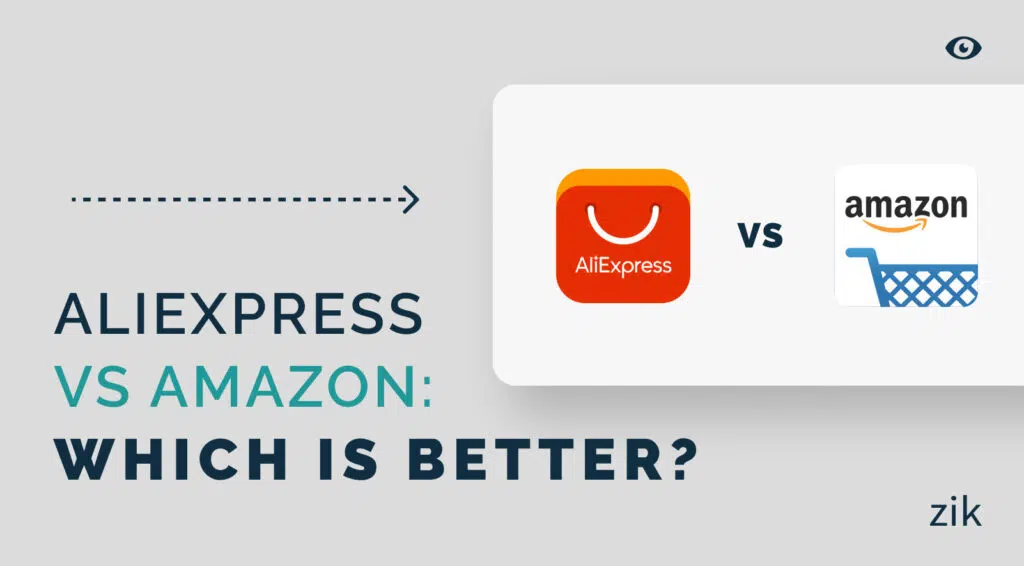E-commerce has become one of the most effective forms of buying and selling.
In the past two decades, you’ve probably pulled out your credit card once or twice to take advantage of those insane Black Friday and Cyber Monday discounts on Amazon, AliExpress, Walmart, and numerous other online retail stores.
However, with the recent expansion of online shopping comes the problem of deciding which platform to trust to buy online from with your hard-earned money. Amazon and Aliexpress being the two biggest e-commerce platforms in the world, always cause an internal battle of choice. AliExpress prices are a significant factor in this comparison, as items on AliExpress tend to be cheaper due to their production base in China and other Asian countries with abundant labor resources.
In this article, we’ll spill the tea on the best platform to use by comparing and analyzing their pros and cons. But before we go into the full details, let’s see a brief background of AliExpress vs Amazon.
Overview of AliExpress and Amazon
AliExpress and Amazon are two of the largest e-commerce platforms in the world, each offering a vast array of products to customers globally. While both platforms serve the same fundamental purpose of connecting buyers with sellers, they operate on different business models and cater to slightly different market segments.
AliExpress, launched in 2010, is a subsidiary of the Chinese conglomerate Alibaba Group. It primarily connects buyers with Chinese sellers, offering a wide range of products at competitive prices. The platform is particularly popular among dropshippers and bargain hunters due to its lower prices and frequent promotions.
Amazon, founded in 1994 by Jeff Bezos, started as an online bookstore and has since evolved into the largest e-commerce platform globally. Unlike AliExpress, Amazon sells its own products alongside third-party items, providing a more controlled shopping experience. Amazon is known for its vast product range, including high-end and branded items, and its robust logistics network that ensures fast and reliable shipping.
While both platforms offer a wide variety of products, the key differences lie in their pricing strategies, shipping times, and overall shopping experience. Let’s delve deeper into these aspects to understand which platform might be better suited for your needs.
What is Amazon
Founded in 1994 by Jeff Bezos, Amazon is currently the largest e-commerce platform in the world.
It was formally founded as an online bookstore store that sold books via the internet, but with its expansion, it soon pivoted to an online marketplace where you could sell just about anything one could think of. These include self-owned products and third-party products as well.
What is AliExpress
AliExpress, on the other hand, is an online retail service that started 16 years later out of China and has since grown exponentially to become the second biggest e-commerce website, just behind Amazon.
However, unlike Amazon, AliExpress is a just a e-commerce platform as it does not sell its own products to consumers. AliExpress suppliers are crucial for the platform’s business model, connecting buyers directly with manufacturers.
Let’s take a look at how similar and how different AliExpress and Amazon are at the same time.
Pricing and Product Range
When it comes to pricing, AliExpress is renowned for its competitive pricing, often offering products at significantly lower prices compared to other platforms. This is largely because AliExpress connects buyers directly with suppliers from China, cutting out intermediaries and reducing costs. The platform frequently runs promotions and offers very succulent discounts, making it an attractive option for price-conscious buyers.
Amazon, on the other hand, employs a more complex pricing strategy. Prices on Amazon can vary depending on the seller, product, and location. While Amazon does offer competitive pricing, it may not always be the cheapest option. However, Amazon’s product range is more extensive, including high-end and branded items that may not be available on AliExpress. This makes Amazon a go-to platform for those looking for a wider variety of products, including exclusive deals on branded items.
In summary, if you’re looking for lower prices and frequent discounts, AliExpress is the way to go. However, if you need a broader product range, including high-end and branded items, Amazon might be the better choice.
Competitive Pricing
AliExpress has gained popularity for being the most affordable place you find something on the internet. This makes is a very popular source for drop shippers, specifically those dropshipping on platforms like eBay and even Amazon.
Dropshippers often collaborate with an AliExpress supplier to source products for sale on other platforms like Amazon, leveraging the logistics of purchasing items from AliExpress and having them shipped directly to customers.
Products on AliExpress are so inexpensive that you can buy products under the $2 mark. And it makes sense considering that most of these cheap products being sold there are produced in the East, where their currencies are often weaker, and labor costs are cheaper.

Source: AliExpress.com
While Amazon, although not as inexpensive as AliExpress, is still relatively affordable when compared to the prices of most brick-and-mortar stores and physical stores.
The existence of countless products from different brands in the same product category breeds healthy competition, helping to bring the average retail prices lower on the website.
However, some products listed on Amazon are simply products grafted directly from AliExpress by drop shippers.
To check whether an Amazon item is actually coming from AliExpress, you can simply search AliExpress by image and instantly find matching suppliers, original pricing, and product variants without guessing keywords.
And, of course, the business model of these drop shippers is entirely predicated on their reselling these products at a premium to users on Amazon. We’ve found that in some cases, it would simply be cheaper to go directly on AliExpress and order the desired item.
Safety & Buyer Protection Policies
AliExpress and Amazon are safe platforms to buy from because they use secure payment and shipping methods that protect your card details, bank information, and identity.
AliExpress lets you save your preferred cards, bank accounts, and payment methods for faster payments. Amazon also has the same payment methods, but also includes Amazon Pay, which is a virtual Amazon wallet that provides you with benefits after each transaction.
AliExpress and Amazon both offer buyer protection policies, which can be helpful when making payments online because you never know what might go wrong.
Shipping Time/Cost and Delivery
Shipping time and cost are critical factors to consider when choosing between AliExpress and Amazon. AliExpress shipping times can vary greatly, depending on the supplier and location, with delivery times ranging from 15-25 days for buyers abroad. This variability can be a drawback for those who need their items quickly. However, AliExpress often offers free and unlimited shipping options, which can be a significant advantage for budget-conscious shoppers.
Amazon, on the other hand, excels in shipping efficiency. The platform offers expedited shipping options, including same-day and one-day delivery, making it a better option for customers who need fast shipping. Amazon Prime members enjoy additional benefits, such as unlimited free shipping and access to exclusive deals. While Amazon’s shipping costs are generally higher than AliExpress, especially for international deliveries, the reliability and speed of Amazon’s shipping make it a more attractive option for those who value convenience and fast delivery times.
In conclusion, if you prioritize fast shipping and reliable delivery, Amazon is the better choice. However, if you’re willing to wait a bit longer to save on shipping costs, AliExpress offers a more budget-friendly option.
Customer Service & Ease of Return/Refund
Amazon manages all purchases on its website, even those from its FBA (third-party) sellers. With its highly efficient customer service, it is a breeze trying to resolve problems of all sorts, including returning unsatisfactory purchases.
And the company automatically issues a refund to whatever payment method was used for the order after they confirm receipt of the return.
With AliExpress, returns cannot be quickly processed once the merchandise has been shipped. This is because the platform leaves that entirely up to the sellers’ discretion to manage and process.
Even after processing returns successfully, it takes forever to get a refund for the money spent on the online purchases.
Trying to resolve this discrepancy often leads to poor customer service experienced by the majority of reviewers leaving essays on TrustPilot, bad-mouthing the quality of their customer service quality.
Discounting the above-listed problem, the customer service of AliExpress can also be pretty helpful.
Trustworthiness of Reviews
It’s strange how we’ve adapted to making decisions based on the opinions of entire strangers online. But it is at this point an unwritten rule that every e-commerce platform should have a section for reviews on each product page.
Checking previous customers’ experiences can assist new potential purchasers in assessing an item’s quality and the merchant’s reputation before deciding whether to buy it or their alternative.
Amazon has a stricter review moderating and verifying policy, which generally makes for better quality products or at least makes it easier to compare prices and distinguish the bad ones from the good ones.
However, with AliExpress, the review section is the wild wild west, infused with many spams, ingenuine comments, and bought reviews. This adds extra difficulty to the challenge of trying to assess the quality of products on the site.
Overall Quality
Product quality is a crucial factor for buyers on both platforms. The quality of items purchased from Amazon is unquestionably high. According to studies by Jungle Scout, more than 70% of Americans trust Amazon over all the other endless choices they could pick from.
This does not imply that all products bought on AliExpress are substandard. However, with a high range of lower prices for inexpensive stuff floating around on the website, many of these relatively inexpensive items are simply of cheap quality.
In essence, AliExpress has more variability in the quality of its merchandise.
Let’s take a look at some of the things that set AliExpress
Choosing the Right Seller
Choosing the right seller is crucial when shopping on AliExpress or Amazon, as it can significantly impact your overall shopping experience. Both platforms have a large number of sellers, and not all of them are reliable.
On AliExpress, it’s essential to look for suppliers with high ratings, positive reviews, and a large number of sales. Checking the seller’s return and refund policies before making a purchase is also crucial. AliExpress allows buyers to contact sellers directly, which can be helpful for negotiating terms and clarifying any doubts.
Amazon also has a vast number of sellers, but the platform’s Fulfillment by Amazon (FBA) program can serve as a good indicator of a reliable seller. Products fulfilled by Amazon are stored and shipped by Amazon, ensuring faster and more reliable delivery. Additionally, looking for sellers with high ratings, positive reviews, and a large number of sales can help you make an informed decision.
In summary, both platforms require careful consideration when choosing a seller. By paying attention to ratings, reviews, and sales numbers, and taking advantage of programs like Amazon’s FBA, you can ensure a smoother and more reliable shopping experience.
In conclusion, AliExpress and Amazon are two different e-commerce platforms with unique features, advantages, and disadvantages. While AliExpress offers competitive pricing and a wide range of products, Amazon provides reliable shipping, fast delivery, and a wider range of high-end and branded items.
By understanding the key differences and similarities between these two platforms, customers can make informed decisions and choose the best option for their needs. If you’re looking to buy bulk quantities of products with consistent quality and much faster shipping than typical AliExpress orders, you can try Supplyia China sourcing agent service.
AliExpress – Pros and Cons

Pros
- You can find products at the most economical prices, even compared to other marketplaces. Sales and discounts are also run regularly, where you can purchase items at attractive prices.
- AliExpress has a wide variety of products and categories that its competitors unmatch. You can easily find what you’re looking for on the platform.
- The website can be viewed in 16 languages, making it easier for buyers and sellers worldwide to communicate.
- Sellers on AliExpress provide multiple shipping options that you can choose from.
- AliExpress allows buyers to contact the sellers directly and further negotiate the terms of their purchase.
Cons
- Some of the unbranded items on AliExpress are sold by unknown merchants, who may not be reliable.
- Delivery and returns can take a long time to ship as the products may not be stocked in your country, or they may only be available from warehouses that are far away.
Amazon – Pros and Cons

Here are a few benefits and disadvantages of the e-commerce giant:
Pros
- Shipping times are quick, with same-day deliveries possible through a vast network of fulfillment centers worldwide.
- Amazon guarantees product conditions, delivery times, and eligibility for returns for products marked as “Fulfilled by Amazon – FBA” (which you can filter while buying).
- You can find more offers and discounts on branded products in the online store than at an offline store.
- If you sign up for Amazon Prime monthly or yearly subscription, you’ll get free shipping on purchases and access to other perks such as Prime Video and Amazon Music.
Cons
- Amazon is committed to selling only branded products, which makes it difficult for start-up companies to get their new products listed.
- Amazon’s product and shipping costs are higher than those of other online retailers.
Final Thoughts on AliExpress vs Amazon
At the end of the day, the decision whether to shop on Amazon or AliExpress depends on you and your values. If you’re looking for something super affordable and do not mind the extra waiting time, AliExpress would be the obvious choice.
However, If you’re a buyer who is super conscious about the standard of your item or you want your product before the end of the day, then Jeff Bezos’ online retailer may be your best bet
Ready to Start AliExpress to eBay Dropshipping?
Take the guesswork out of product sourcing. With ZIK Analytics’ AliExpress to eBay dropshipping tool, you can instantly find profitable products, analyze supplier reliability, and uncover real sales data. Use these insights to expand beyond Amazon and build a successful eBay dropshipping business powered by accurate, up-to-date data using the best AliExpress to eBay dropshipping software and Amazon to eBay dropshipping software.
Frequently Asked Questions on AliExpress vs Amazon
Here are some frequently asked questions on AliExpress vs Amazon:
Which is better, Amazon or AliExpress?
Amazon is better for fast shipping, higher-quality control, and strong customer protection, making it ideal for buyers wanting reliability. AliExpress, on the other hand, offers cheaper prices and bulk-buying options, but delivery takes longer and product quality can vary between sellers.
What are the disadvantages of AliExpress?
The main disadvantages of AliExpress are long shipping times, inconsistent product quality, and limited customer support. Buyers may face delays or disputes with overseas sellers, while sellers deal with high competition, lower trust levels, and thin profit margins due to cheap pricing.
Is AliExpress owned by Amazon?
No, AliExpress is not owned by Amazon. It’s part of the Alibaba Group, a Chinese multinational company founded by Jack Ma. While Amazon is based in the United States, AliExpress operates globally as a marketplace connecting Chinese suppliers with international buyers.
Can I sell AliExpress products on Amazon?
Yes, you can sell AliExpress products on Amazon through dropshipping or reselling, but you must follow Amazon’s policies. Ensure products meet quality standards, include accurate descriptions, and comply with trademark and copyright laws to avoid account suspension or intellectual property violations.
Why is AliExpress so much cheaper than Amazon?
AliExpress is cheaper because most products come directly from Chinese manufacturers, cutting out middlemen. Sellers have lower overhead costs and often use economy shipping to reduce prices. Amazon products, by contrast, include logistics, warehousing, and quality assurance costs that raise retail prices.
Is it wise to buy from AliExpress?
Yes, it can be wise to buy from AliExpress if you’re looking for low-cost products and are willing to wait for longer shipping times. Always check seller ratings, reviews, and product photos to avoid scams or poor-quality items, as quality varies between sellers.













